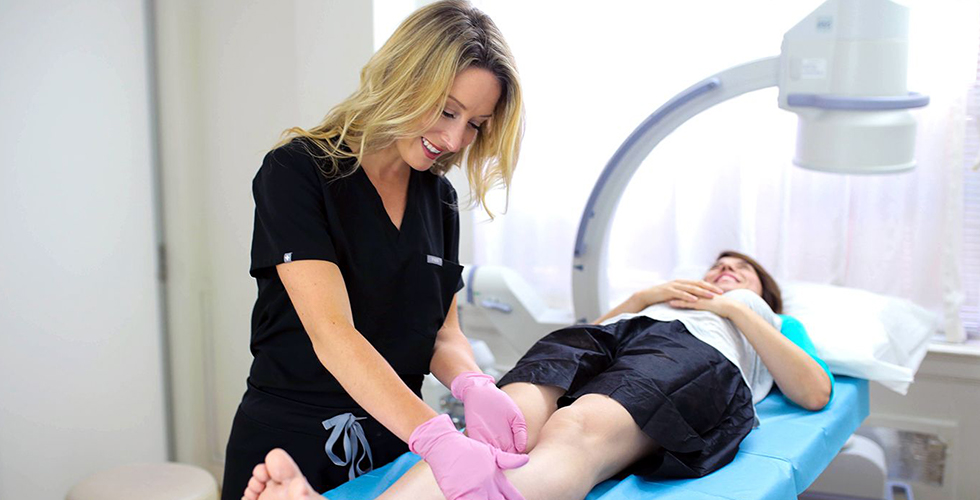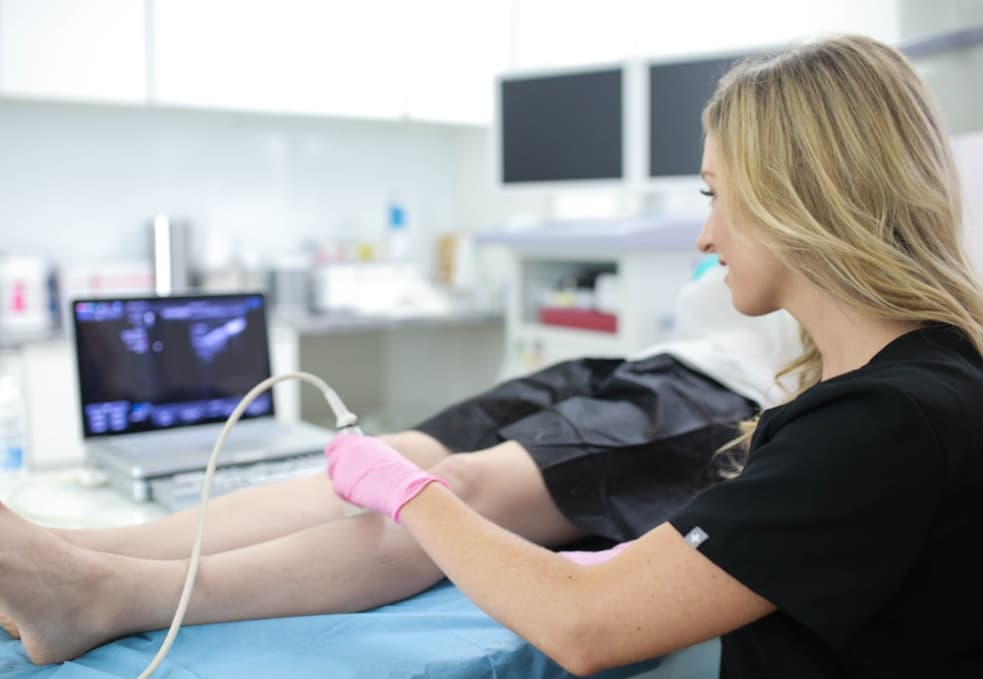Do I need treatment for heavy legs?
If you have achy legs or heavy legs, you don’t necessarily have to worry. It’s perfectly normal and expected to have achy legs or heavy and tired legs after a workout or period of exertion. But if your legs are persistently heavy and tired for no particular reason, you may have an underlying medical condition. If you have persistently heavy legs, you need to contact a reliable vein doctor for a thorough diagnosis. Leg heaviness can be caused by numerous factors, such as peripheral arterial disease, chronic venous insufficiency, varicose veins, and more.
Our medical centers for vein treatment in Long Island specialize in the thorough diagnosis and treatment of leg heaviness. Our board-certified and Harvard-trained vein doctors carefully examine your legs, discuss your symptoms, review your medical history, administer vascular imaging tests, such as duplex ultrasound, and diagnose the root cause of your heavy and tired legs. After a thorough diagnosis, our vein doctors determine if you need treatment for heavy legs and if the symptoms can be handled without treatment.
If you have achy legs, heavy legs, or heavy and tired legs, please schedule an appointment at our medical center for vein treatment in Long Island.

What are the causes of leg heaviness?
Overtraining
Overtraining and excessive exertion are the most common reasons for leg heaviness, especially at the end of a strenuous workout. If you scale up your efforts suddenly, your legs might feel heavy and tired because the muscles aren’t used to the strain. When you overtrain your muscles, i.e., push them past their limits, they don’t have enough time to heal and repair, leading to leg heaviness and achy legs. If your leg heaviness is caused by overtraining, it might be advisable to slow down and give your body time to repair itself.
Peripheral Arterial Disease
Peripheral arterial disease is a cardiovascular condition related to the veins and arteries, i.e., the blood vessels. When fat cells accumulate in the walls of the arteries, blood can’t flow effectively towards different parts of the body, such as the legs, leading to achy legs or heavy and tired legs. If you have achy legs because of PAD, the affected artery may have cut off blood circulation to the legs. The risk of peripheral arterial disease is particularly common amongst individuals with diabetes, high blood pressure, and high cholesterol.
Restless Leg Syndrome
Restless leg syndrome is a condition wherein your legs feel jittery, and you have an uncontrollable urge to shake your legs. If you suffer from restless leg syndrome, your legs might also feel heavy and tired from the continuous movements. If the symptoms of leg heaviness and restless leg syndrome worsen at the end of the day or after long periods of sitting or standing still, there’s a strong chance that you have underlying chronic venous insufficiency, which we will discuss in detail later.
Varicose Veins
Varicose veins are dense blood vessels that protrude out of the skin’s surface. They usually look like a thick mass of tangled, twisted, or knotted ropes protruding from the skin’s surface. Some patients also compare them to dense tree trunks. Varicose veins are essentially damaged blood vessels with excess blood accumulation, which makes the vein walls dilate and protrude outwards. The presence of varicose veins can lead to leg heaviness because of the increased volume of blood in the legs.
Chronic Venous Insufficiency
Chronic venous insufficiency is the root cause of most vein problems, including leg heaviness, restless leg syndrome, and varicose veins. Healthy veins have valves that act as one-way doors, allowing blood to flow towards the heart against the force of gravity. When the vein valves collapse, blood flows backward and accumulates in the leg veins, eventually leading to dilated veins and varicose veins. If your legs feel especially heavy and tired at the end of the day, there’s a strong chance you have chronic venous insufficiency.
How to treat leg heaviness at home?
If your leg heaviness is caused by chronic venous insufficiency, you can’t treat the condition at home. Chronic venous insufficiency is a dangerous circulatory disorder, and there’s no way to treat this condition without medical intervention. However, you can implement the following lifestyle changes to alleviate leg heaviness and reduce the discomfort:
- Wear compression stockings to push the accumulated blood towards the heart.
- Engage in cardiovascular exercises that activate your calf muscles, such as running, swimming, cycling, and yoga, to push blood towards the heart.
- Elevate your legs while sitting down to push blood towards the heart.
- Don’t sit or stand still for long periods of time. If you have a desk job, take short walking breaks every 30 minutes to ensure optimal blood circulation.
How to get rid of heavy legs permanently?
If you want to get rid of heavy legs permanently, you need to find a reliable medical center for vein treatment in Long Island. Our vein doctors always diagnose and treat the root cause of leg heaviness to ensure safe and long-lasting results. During your consultation, the vein doctor performs a duplex ultrasound test to visualize the blood flow in your leg veins, determine if you have chronic venous insufficiency, and curate a personalized vein treatment plan.
If you have vein disease, the vein doctor performs radiofrequency ablation, endovenous laser ablation, or venaseal. These are minimally invasive procedures that use thermal energy, laser energy, or medical adhesives to collapse or destroy the diseased saphenous vein, rerouting the accumulated blood into healthier leg veins. The diseased vein is eventually absorbed by the body. These procedures restore optimal blood circulation to alleviate pressure from your leg veins, which, in turn, alleviates leg heaviness.
